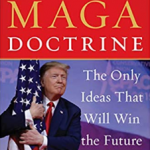This is my second post on Charlie Kirk’s “manifesto” of the “Trump movement”, The MAGA Doctrine. My first post was a broad overview of the prism through which Kirk sees the world. Towards the end of his book Kirk reflects on how it all started, on what set him on “the road toward conservatism”:
From “About the Author” in The MAGA Doctrine:
CHARLIE KIRK is the founder and president of Turning Point USA, the largest and fastest-growing conservative youth activist organization in the country with over 250,000 student members, over 150 full-time staff, and a presence on over 1,500 high school and college campuses nationwide. Charlie is also the chairman of Students for Trump, which aims to activate one million new college voters on campuses in battleground states in the lead-up to the 2020 presidential election. His social media reaches over 100 million people per month, and according to Axios, his is one of the top 10 most engaged Twitter handles in the world. He is also the host of The Charlie Kirk Show, which regularly ranks among the top news shows on Apple podcast charts.
As I look forward to a MAGA future, I also remember how I first started on the road toward conservatism.
I have a sixth-grade social studies teacher to thank—though not in the way one usually thanks teachers and other mentors. Deviating from the usual civics lessons around the time of the Iraq War’s start, this teacher railed against then-president George W. Bush. I would come eventually to see the war in Iraq as a mistake myself and to see the Trump-era Republican Party as an improvement over the Republican Party of the Bushes.
But of course the teacher couldn’t stop there. He went on to denounce the United States in general. He made the whole country’s history sound like a litany of evil, from genocide to slavery to oppression of women, capped by imperialism and mistreatment of immigrants. That’s a lot to foist on sixth-graders, though that’s normal in schools these days.
You may have had similar experiences in childhood yourself. It was one of those moments in which you know the authority figure probably has most of his basic facts right, but you still have a nagging feeling that he’s missing something, something you can’t immediately identify. You also know that even though you’ve only been alive and part of this country for a few years, you feel attacked. This place that you love and trust is being trashed.
It’s not that you believe the United States can do no wrong. You don’t dismiss the evils of slavery or think other terrible things from the history books are make-believe. You have a strong suspicion, though, that for all our mistakes, things worked out pretty well—not just for a few but for the population as a whole—eventually. There’s something fundamentally good about the United States, at least as compared to so many troubled and brutal places throughout the world, throughout history.
Not just good about the United States—great.
The teacher wasn’t suggesting everything about the United States was hopeless, either, but he made clear he thought that conservatives were leading the country down the wrong road. They were fools, he seemed to suggest, who thought in their arrogance that the country could do no wrong. The best hope for us all, then, was liberalism, and not just classical liberalism but the left. A good dose of self-doubt and shame might rein in this country gone awry, and voting for the Democrats was probably step one, at least if we took seriously the implied civics lesson underlying everything else we were hearing in social studies class.
That’s an interesting and revealing “confession” or “testimonial”. It reminds me of the conversion experiences of the religious and moments that led others down the path towards extremist radicalization (see side box for some discussions about this process). Here are my thoughts as I read the above:
Commentary
I have a sixth-grade social studies teacher to thank
There’s a warning there. One would hope there would be time and opportunity to learn far more about the many parts that make this world work before letting one’s views solidify.
Deviating from the usual civics lessons around the time of the Iraq War’s start, this teacher railed against then-president George W. Bush. I would come eventually to see the war in Iraq as a mistake myself and to see the Trump-era Republican Party as an improvement over the Republican Party of the Bushes.

